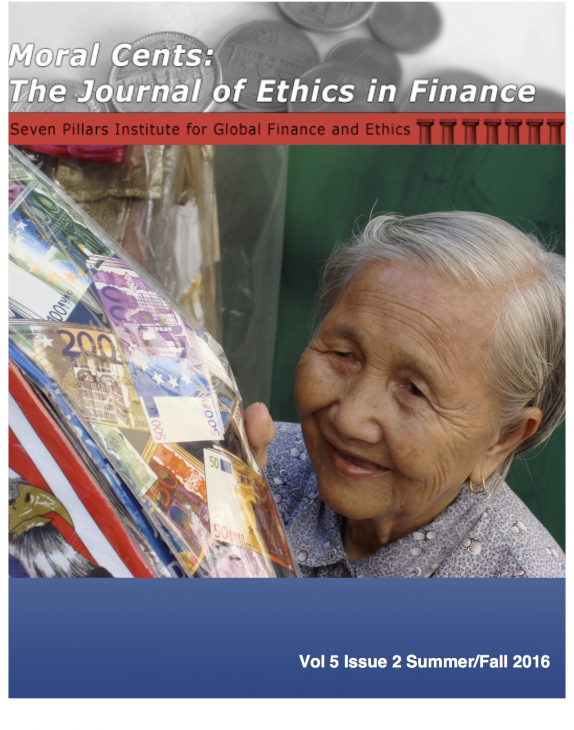Moral Cents: The Journal of Ethics in Finance (Summer/Fall 2016)

None of the articles in this issue of Moral Cents: The Journal of Ethics in Finance are about the recent US Presidential election and its outcome. The Institute will doubtless, have more to write on subsequent actions in the coming months and years under the new Administration and Congress. There already is the inevitable victory roar to rollback Dodd-Frank, deregulate and allow market forces free rein, without any mention of strengthening and instilling a sense of personal and institutional ethical responsibility. As a colleague observed, the Great Financial Crisis (GFC) has a long tail. The irony of the situation is those most responsible for the GFC are now back in fashion and probably back in the halls of political power.
Thus, some of our readers may be relieved to see us pivot to China and the rest of the world in this issue of Moral Cents. First, Toby Wai examines the ethical implications to minority shareholders of increasing Chinese corporate debt. He looks at the costs and benefits of high debt levels in the context of Chinese corporate governance with a laser focus on non-state owned companies. The article describes how interests of minority shareholders are undermined and suggests a way out of some of these problems.
Yucheng Lu continues with an eye on China with his examination of the rightness or wrongness of including the Chinese Reminbi in the International Monetary Fund’s Special Drawing Rights (SDR) basket. The Yuan was the fifth currency to join the SDR currency basket and some have raised concerns about including the currency of an authoritarian regime. Others claim the Chinese authorities manipulate the currency and question the legitimacy of its inclusion in the SDR basket. The author attempts to illuminate the issues and derive answers to these ethics related questions.
From China, Rahim Daya then transports us to East Africa. His article gives thoughtful consideration from an ethics perspective, of an East African Community Monetary Union (EACMU). The Union gathers six nations into an advanced integration unit. Daya gives a short history behind the EACMU and weighs the ethical implications of such a union, looking specifically at asymmetric shocks and corruption.
While many in the world are disillusioned with finance, it appears financial capitalism is still with us and might be made even stronger in the following years. Nicola Bilotta writes about ethics in the time of financial capitalism. The article describes Minsky’s theory proposing capitalism is endogenously unstable and critiques management incentive schemes. The way to establish a bond between finance and ethics is to ensure there is extrinsic public regulations and intrinsic moral auto-regulation.
We end the issue with an essay by Dr. YRK Reddy who discusses the commonly encountered relationship between of state-owned enterprises (SOEs) and corruption. He takes us around the world giving institutional examples and calls for action against this global problem.
Dr. Kara Tan Bhala
November 2016
-x-
Moral Cents: The Journal of Ethics in Finance is published by
Seven Pillars Institute for Global Finance and Ethics
ISSN 2326-5663
Editor: Dr. Kara Tan Bhala
Articles Editor: Eric Witmer
